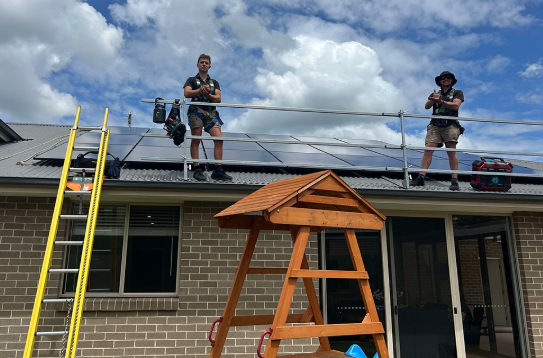As energy costs continue to rise, more Australian homeowners are turning to solar power as a smart and sustainable way to reduce electricity bills. However, the effectiveness of your solar system depends not only on the quality of the panels and equipment you choose but also on the expertise of your residential solar installer. A skilled installer does more than simply mount panels on your roof—they design, configure, and optimise your system to ensure maximum efficiency and long-term savings.
In this blog, we’ll explore how a residential solar installer can help you get the most out of your solar investment.
1. Professional Site Assessment and Custom Design
Every home is different, and a one-size-fits-all solar solution rarely delivers the best results. A residential solar installer begins with a comprehensive site assessment, evaluating factors such as:
- Roof orientation and pitch – to determine optimal panel placement.
- Shading issues – from trees, nearby buildings, or chimneys.
- Household energy usage patterns – to size the system correctly.
By analysing these variables, the installer designs a tailored solar system that maximises sunlight capture and aligns with your unique energy needs. This ensures you’re not overspending on unnecessary panels or undersizing your system.
2. Recommending the Right Solar Equipment
Not all solar panels and inverters are created equal. Residential solar installers have in-depth knowledge of leading brands and technologies, such as high-efficiency panels, microinverters, and battery storage solutions.
A trusted installer will:
- Recommend equipment that delivers the best efficiency for your budget.
- Explain the long-term value of premium products versus cheaper alternatives.
- Help you future-proof your system by advising on battery storage options, like the Tesla Powerwall or other advanced solutions.
By matching the right equipment to your home, a solar installer ensures you save more over the lifespan of your system.
3. Optimal Installation for Peak Efficiency
Even the best solar panels will underperform if not installed correctly. Residential solar installers bring expertise in roof engineering, electrical safety, and optimal positioning.
They know how to:
- Angle and orient panels to maximise sun exposure throughout the year.
- Avoid losses caused by poor wiring or substandard installation practices.
- Ensure compliance with Australian Standards and Clean Energy Council (CEC) requirements.
A correctly installed system can boost energy output by 10–20% compared to poorly installed panels, directly impacting your electricity savings.
4. Integration with Smart Energy Solutions
Modern solar systems can do more than just generate power. A professional residential solar installer can integrate your system with smart energy management tools such as:
- Monitoring apps that track real-time energy generation and usage.
- Load-shifting technology to use appliances when solar output is at its peak.
- Battery storage for night-time energy consumption and blackout protection.
These integrations ensure you consume more of the power you produce, reducing reliance on the grid and lowering bills even further.
5. Maximising Government Incentives and Rebates
Australia offers a range of solar incentives, including the Small-scale Renewable Energy Scheme (SRES), which provides financial benefits through Small-scale Technology Certificates (STCs). State governments may also offer rebates or feed-in tariffs for excess energy exported to the grid.
A knowledgeable residential solar installer will:
- Guide you through available incentives.
- Handle the paperwork to ensure you receive maximum benefits.
- Advise on the best way to leverage feed-in tariffs for extra savings.
This expertise ensures you save not just on your energy bills but also on upfront installation costs.
6. Long-Term Maintenance and Support
Your solar system is a long-term investment designed to last 20–25 years or more. However, like any technology, it requires occasional servicing to operate at peak efficiency.
Residential solar installers often provide:
- Regular system check-ups and cleaning services.
- Performance monitoring to quickly detect issues.
- Warranty support for both equipment and installation.
With ongoing professional care, your system will continue to deliver optimal savings for decades.
7. Avoiding Costly Mistakes with DIY or Unqualified Installers
Some homeowners are tempted by the idea of DIY solar or hiring low-cost, unaccredited installers. While this may seem cheaper upfront, it can lead to:
- Inefficient systems that fail to reduce energy bills effectively.
- Voided warranties if equipment isn’t installed by certified professionals.
- Safety risks due to incorrect wiring or mounting.
By choosing an accredited residential solar installer, you gain peace of mind knowing your system is safe, compliant, and designed for maximum returns.
8. Achieving Energy Independence
Ultimately, a skilled solar installer helps you take control of your energy future. By reducing grid reliance, you protect yourself against rising electricity prices while enjoying cleaner, renewable power. When paired with a solar battery, your home can achieve near-complete energy independence, significantly cutting bills and boosting sustainability.
Final Thoughts
Investing in solar is one of the smartest financial and environmental decisions a homeowner can make. But to truly maximise your savings, it’s crucial to work with a professional residential solar installer. From system design and quality installation to smart energy integration and long-term support, their expertise ensures you get the best possible return on investment.
If you’re considering solar, take the time to research and choose an accredited, experienced installer who understands your needs. With the right partner, your solar system won’t just power your home—it will power your savings for years to come.
